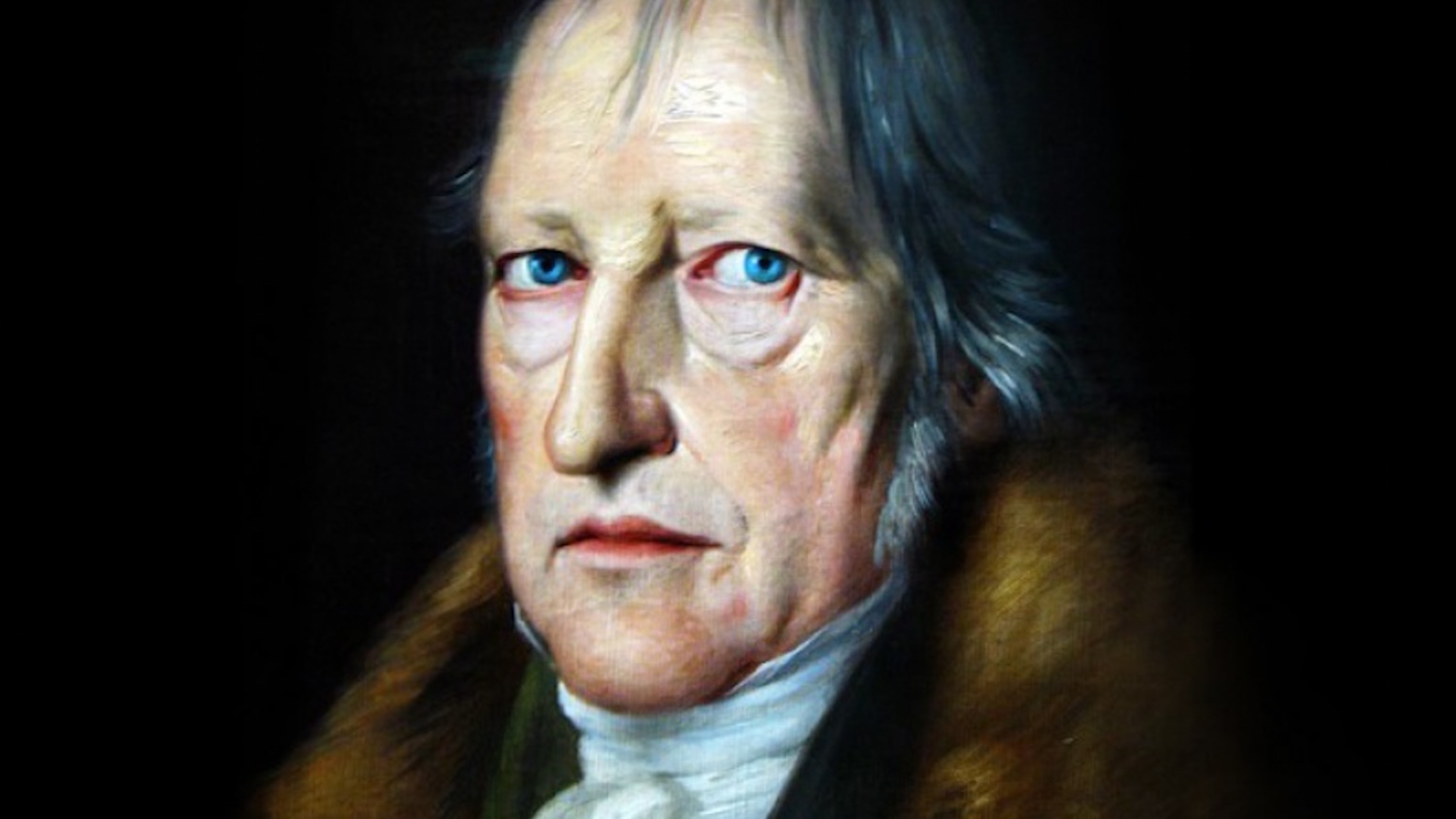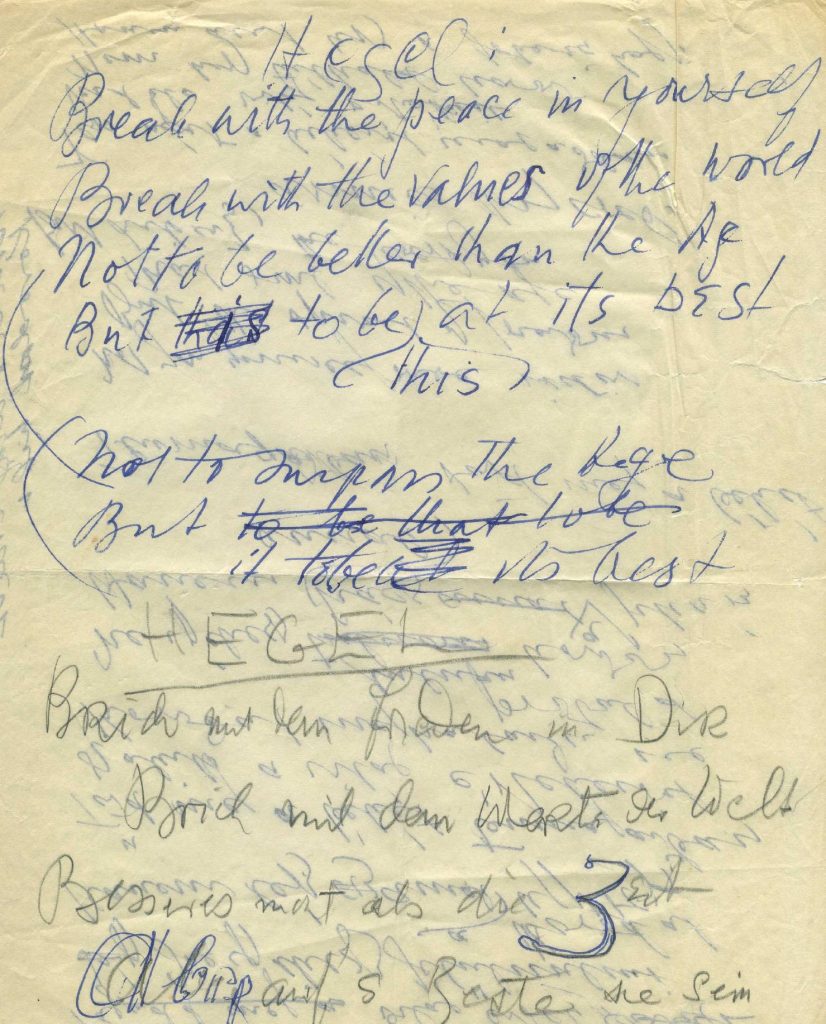
In the archives Box 59, Folder 02, 58 [henceforth: 59/02, 58], there is a reference to Hegel at the back of a sheet of paper, maybe a fragment of a letter, without date, in Hungarian, with a writing hard to read. This folder contains letters sent by Karl Polanyi to his daughter, but it’s not evident to understand why this document is in this folder since the father never wrote to his daughter in Hungarian1. Polanyi wrote firstly in his own English translation and secondly in German.
| Break with the peace in yourself Break with the values of the world Not to be better than the Age But to be this at its best | Brich mit dem Frieden in Dir Brich mit den Werte der Welt Besseres nicht, als die Zeit Aber auf’s Beste zu sein |
Kari Polanyi-Levitt used this for epigraph, in her article “Karl Polanyi and Co-Existence”, published first in Co-Existence in 1964, and a second time in 1990, on The Life and Work of Karl Polanyi, 253-263.
In his “Weekend notes” XIX (December 21, 1957) [AKP 45/14, 47], Abraham Roststein takes note of this quote, when he speaks about Hegel, even if his quote is a little different:
In 1805 (before Jena) Hegel wrote: (approximate translation): “confidently and courageously the son of the Gods may throw himself into the struggle for perfection. Break peace with yourself, break with the work of the world, endeavor and try more than the thing of the present and yesterdays. In doing so, nothing that is better than your own time will you achieve, but that at its very best.”
In spite of both versions, Polanyi’s one and Rotstein’s, I was not able to identify which Hegel’s text Polanyi quoted here, and so in neither of the two volumes of the complete works of Hegel – published at Suhrkamp on 1986 (1st ed.) – concerning the period.
In 1804 or 1805, volume 2 gives two possible documents:
- Rosenkranz’ Bericht über das Fragment vom göttlichen Dreieck [1804]
- Aphorismen aus Hegels Wastebook [1803-1806]
…
Note
- Du moins en 1990. ↩︎
- Le problème est que la date de ne coïncide pas puisque Hegel est à Iéna dès 1801. Faut-il donc chercher dans les textes plutôt en 1799-1800 ou 1804-1805 ? ↩︎
- Traduction approximative de ce que Polanyi a dit à Rotstein, traduit de l’allemand en anglais, et maintenant de l’anglais en français… ↩︎
- Romps avec le cours du monde, écarte-toi du monde ? ↩︎
- Efforce-toi de dépasser le présent et les passés – pourquoi un pluriel ? ↩︎

I copy the comment Claus Thomasberger let in the French version, just when I was creating the multilingual version of this blog (and I don’t know how to change the place of this comment):
“We think that these are lines from Hegel’s poem ’Entschluss’ (Decision) written in 1801: „Kühn mag der Götter Sohn der Vollendung Kampf sich vertrauen,/ Brich den Frieden mit dir, brich mit dem Werke der Welt!/ Strebe, versuche du mehr als das Heut und das Gestern! so wirst du/ Besseres nicht, als die Zeit, aber auf’s Beste sie sein!“” [Claus Thomasberger, September 14, 2017]
Thanks a lot, Pr. Thomasberger!
Shortly after your reply, I searched in Google.fr (our ‘Western’ Baidu) informations about this Hegel’s poem finally identified and I saw, in the first results, that Giorgo Resta’s introduction to collection of Polanyi’s texts, “For a New West”, in 2014 (English version), spoke about it. So, I had my answer right in front of me, since I have this text in Kindle version, and I didn’t see him, since I totally forgot this introduction during my investigations. A warm thank you again, and now the question moves to the analyze of the very poem of Hegel, and, in parallel, on the question his reception by Karl Polanyi (when, why, why this text seems so important for him).